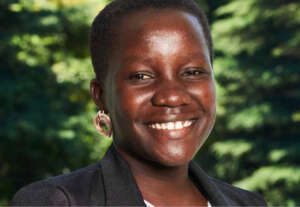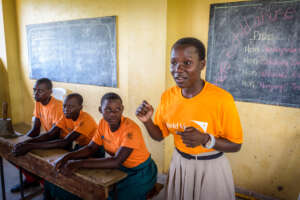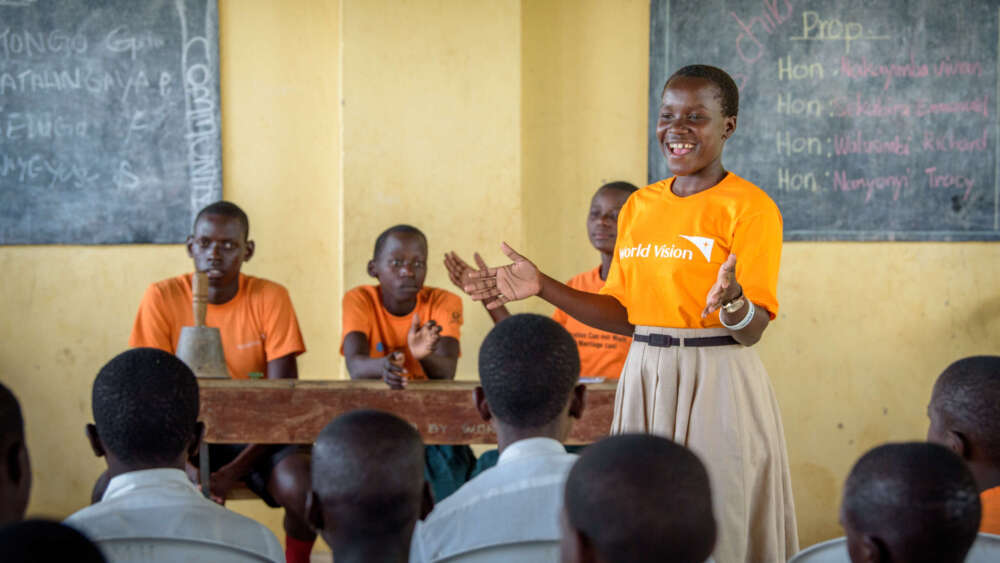From forced child bride to award-winning advocate
Meet Agnes Kabonesa, the young leader who’s become a local hero
Nineteen-year-old Ugandan Agnes Kabonesa possesses the kind of compelling optimism that is common to youth. Speaking with her, you get the sense she is not only capable of changing the world, but destined to do so. It’s inspiring.
What Agnes doesn’t have, though, is the naivety that usually accompanies such youthful optimism. There’s no rose-coloured glasses impeding Agnes’ perspective. She’s lived through too much to be deceived. And more importantly, she has experienced the heart-transforming power of God’s forgiveness.

Agnes was just fifteen years of age when a young man came to meet her at school and told her “Now, from today onwards, you are my wife. You belong to me.”
“I was like ‘What happened?’” Agnes says.
The young man – himself only 17 years of age – said he’d arranged the matter with her mother, paying her a dowry of a cow, 50,0000 Ugandan Shillings ($A18.43), and some cassava. The entire arrangement was finalised without Agnes’ knowledge.
“In most of African traditions, girls are looked at as a social dowry, as social wealth,” Agnes explains.
“I am from a single mother. My dad married three wives and my mum could not stand the pressure because she was the first wife, [so] she left and came back to their home. There was three of us,” she says, describing her sister and brother.
“When we [the two sisters] reached a certain age, our mum began looking at us as a social dowry. So, when I was 15 years and I was in my senior year, because she could not afford the basic needs we needed for life – she could not afford groceries for us – she felt to marry me off to give her an opportunity to take care of the others.”
For Agnes, being in a forced marriage increased the hardships she’d already experienced in life.
“I was a child, I didn’t know my rights,” she reflects. “I was ignorant about many things. So, soon after I was in that marriage, I got pregnant. And when I got pregnant, and I had my baby, the baby died within 12 hours.”
Agnes had been experiencing labour pains for an entire week before delivering but had nobody who could take her to a hospital. She was deeply grieved by the loss of her child – a grief that was compounded by others in her community treating her differently. Not only did they consider her to be a mother, rather than a child, they also held her responsible for the death of her child.
“I was a young girl and everybody’s blaming me for the death of my only child. And I was asking myself, how can I kill my own child? … I was so traumatised and disturbed, I decided to stay alone and away from others,” she says.
Agnes stayed alone and missed the entire funeral process, from people coming to the house for mourning to the burial of her child.
A turning point
A month later, Agnes joined a church youth group – a decision that would ultimately change her life.
The church’s youth group put a call out for young people – especially girls – to take part in a community sensitisation program that used music, dance and drama to raise issues of child marriage, gender-based violence, domestic violence, HIV, girls’ education, and other issues relating to women and girls.
Agnes signed up and, as the only fluent English-speaker in the group, found that a new world opened to her as she interacted with the program’s speakers whose words she was translating.
The conversation left Agnes determined to do two things: return to school to complete her studies and leave the marriage she had been forced into.
After one session, Agnes spoke to a World Vision worker who asked Agnes about her marriage, study and goals. The conversation left Agnes determined to do two things: return to school to complete her studies and leave the marriage she had been forced into. Agnes approached the headmaster of the only secondary school in the area and asked him to allow her to complete her studies even though she couldn’t afford the school fees.
He refused, telling her “if students get to know that you are married and you are studying here, they’ll think it’s OK to be married and study as well.” Agnes pleaded, promising to keep her marriage a secret from other students and to study hard. After making Agnes sign an agreement not to mention her marriage to other students, he relented.
That year, Agnes was elected female senior prefect and topped her grade academically. But her marriage was still a disaster, and her young husband began to physically abuse her. Agnes approached the police for help but was told had to cover their costs to receive help – money she didn’t have.
Instead, Agnes tried to leave her marriage several times, returning to her mother and siblings.
“I’d go home for maybe a week or two, and then the boy would come, and my mother and all the clan members would force me back with him,” Agnes explains.
“By that time my mum used to drink a lot. Too much. She would do lots of things which are not good at all, that were even damaging our name. People started to refer to us as the family of the prostitute.”
Agnes knew she needed to find a way to leave her marriage that didn’t include her returning to her mother’s house.
“So I told my mother, I’m going to make a decision and leave this marriage, but I’m not going to come home to you. And neither do I want you to be involved in sending me back. I just want to be alone. Leave me by myself.”
The next time Agnes left her husband, she did so at night, and went to stay at her great grandmother’s house. And, when her mother and the other clan members came there to send her back to the marriage, Agnes stood her ground. Eventually, they gave up and Agnes was free.
Breakthrough
World Vision invited Agnes to share her story of forced marriage and Agnes accepted the opportunity, becoming a child marriage advocate and youth leader during the END CHILD MARRIAGE NOW Campaign.
But when Agnes shared her story for the first time, her mother was furious that she had “sullied her name”.

Agnes Kabonesa, World Vision Uganda ambassador against child marriage, tells her story to a Child Parliament at a school in Nakasongola, Uganda, a World Vision program.
“Every time she wasn’t happy, she would abuse me and tell me, ‘If you had not left that marriage, I would now not be struggling like this'” Agnes says.
Though Agnes tried to explain that marriage was not the only solution to the family’s financial problems, her mother continued to blame her for her struggles and home life deteriorated. Eventually, World Vision was able to cover her costs in a boarding house while Agnes completed the final stage of her studies.
Ironically, it was this provision that helped Agnes mother see how her daughter’s decisions were working out well.
“I sat her down and told her, ‘Mum, you see? By sharing my story, others around from me will ensure that their children don’t get married too early. And I am also getting the opportunity to go back to school! If I finish school, I can be able to provide for you whatever you need, and I’m doing something for myself,'” Agnes says.
Yet Agnes’ relationship was not her only challenge. Agnes discovered she was pregnant by the husband she had so recently left. Undeterred, Agnes completed her studies, then gave birth to a healthy baby girl.
Change-maker
Agnes says she always knew that education was the key to breaking her family’s poverty cycle.
“When I looked at everyone around me, only those who were educated were having a better life. They had money. They had lots to eat – enough to eat. They lived in better houses… they could save, they could commercialise agriculture… everything they had was improved level compared with us who were poor.”
Agnes wanted to not only defy the odds for herself, but to show others it was possible to transform their lives by focusing on education.
Since completing high school, Agnes has earned a Bachelor in Education. She is now continuing her further studies– online, at home in Agago-Pader, Northern Uganda due to COVID, though her original plans were to be in South Africa (Western Cape University).
She was also a young delegate to the African Union Launch of Ending Violence Against Children campaign in 2017 and the European Union Development Days Conference 2018, was a Mandela Washington Fellow in 2018, and received the Diana Award in 2019.
“Being asked to share my story for World Vision opened doors for me to be able to have dialogue with political leaders and even contribute to the amendment of the Children Act in 2016,” Agnes says.
“Being asked to share my story for World Vision opened doors for me to be able to have dialogue with political leaders and even contribute to the amendment of the Children Act in 2016,” Agnes says. The amendment saw the minimum age of marriage (16 years) strengthened legally closing loopholes that clan and traditional leaders had exploited to continue traditional child marriages.
Nowadays, Agnes is regarded as a local hero as the first female university graduate from her village and is invited to speak at schools. When she visits her mum, the villagers bring their children to Agnes, asking her to motivate them to work hard in school.
She’s also been able to secure a permanent house for her mum, along with another for herself.
“Our life is improving and people can see that… without even me telling them that. There’s something actually in having a girl who’s educated,” Agnes says.
A heart transformed
When asked about her relationship now with her mum, ex-husband and local clansman, Agnes is remarkably gracious – which she attributes to the power of God’s forgiveness transforming her heart.
” I learned a lot about forgiveness at a youth fellowship in 2013,” she says. “And when I came back, the first thing I did, was to forgive my mum and my dad and go through a reconciliation process with them. We are very OK with one another now. Actually, my daughter (now eight years old) stays with my mother most times when I’m outside the country.”
Regarding her ex-husband – who is now remarried and has four or five children – Agnes explains, “When I decided to forgive, I didn’t forget…I told him is that I could not go back again to that marriage. But having a smooth relationship with him is very important because of our child,” she says.
“I advise him that he should not let what he went through spoil the future of his children. He needs to work very hard to make sure any children are given a better chance in life,” she says.
“A number of the local clansmen are my neighbours, because clan members are always people from within your family,” Agnes says. “So, I try my best not to think about the past. I think about the future.”
Agnes is working on a vocational education program for those in the area and hopes it will open towards the end of next year. A natural leader, Agnes admits, “From my childhood, I have been a leader. Leadership is part of my life.”
But the real source of her strength throughout life, she says, has been spending time with God.
“Most times when I was broken down, I’d go back home, be by myself, and speak to my God. And I’d cry and I’d cry and I’d cry. And by the end of the day, I’m much better,” Agnes says.
“So many good things have happened in my life every time I have gone into silence and spoken to God.”
Agnes is just one of millions of girls in the world who experience child marriage – and the numbers are increasing as COVID adds financial pressure to the world’s poorest families. World Vision estimates that four million girls are at risk of child marriage in the next two years as a result of the pandemic, and decades of work by Agnes and others like her could be lost. Find out how you can support the work to end child marriage here and here.
Email This Story
Why not send this to a friend?



